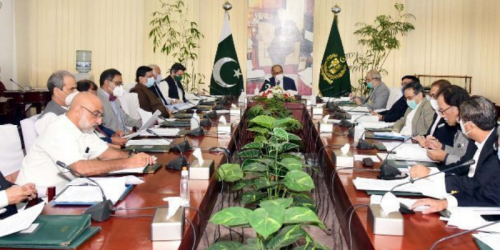ISLAMABAD: The Economic Coordination Committee (ECC) of the cabinet on Wednesday once again approved an increase in electricity rates by Rs1.09 to Rs2.89 per unit for various consumers of Karachi to bring it on a par with the rest of the country, with effect from September 1.
A meeting of the ECC presided over by Adviser to the Prime Minister on Finance and Revenue Dr Abdul Hafeez Shaikh, also ordered immediate disbursement of Rs4.7 billion tariff differential subsidy to K-Electric and approved an amount of up to $142 million to rescue PIA’s Roosevelt Hotel in New York from hostile takeover.
According to an official announcement, the ECC “approved the summary moved by the Power Division for the rationalisation of eleven quarterly adjustments of K-Electric Limited from July 2016 to March 2019”. These quarterly adjustments “will be notified with effect from 1st September 2020 to bring the tariff of K-Electric at par with what is currently in field for consumers of [ex-Wapda] Discos (distribution companies)”, it added.
Based on Nepra (National Electric Power Regulatory Authority) determination, the ECC had approved in March this year an average Rs2.39 per unit increase in KE tariff to bring it on a par with uniform national power tariff. This tariff has been pending for almost three years (11 quarters). In summers, this works out at about Rs3bn per month, which drops to about Rs2bn or averages out at about Rs2.5bn.
Its application was stopped due to the Covid-19 situation at the time. The ECC again gave a go-ahead for its implementation with effect from July 1, 2020, but it was again withheld by the federal cabinet and Prime Minister Imran Khan on the desire of PTI members of the cabinet from Karachi amid floods and loadshedding.
However, as the problems continued, K-Electric was assured during a recent meeting at the Governor House of an immediate increase in its consumer-end tariff.
The non-payment of subsidy by the government and the freeze on tariff are creating cash flow problems not only for K-Electric but also for other power companies because of non-payment of dues against power purchased from the national grid, resulting in a second-tier tariff increase to finance the borrowing costs.
The KE tariff at present is Rs2.89 per unit (Kwh) lower than the rest of the country for almost all commercial categories, temporary residential, all bulk supply tariff, public lighting, residential colonies attached to industrial premises, and all industrial tariff categories.
The KE tariff for all residential consumers is Rs1.65 per unit lower than the rest of the country. The KE tariff for commercial consumers on less than 5kwatt load is Rs1.09 per unit lower than the rest of the country.
Roosevelt Hotel
In order to meet the financial challenges faced by Roosevelt Hotel, the ECC approved up to $142m for PIA-IL (PIA International Limited) on the recommendation of a committee constituted in an earlier meeting of the ECC. The committee, headed by deputy chairman of the Planning Commission, comprised secretaries of the Finance Division, Aviation Division and Law and Justice Division.
The ECC had about two weeks ago approved in principle payment of $125m (about Rs21bn) liabilities of the PIACL-owned Roosevelt Hotel in New York, resulting from a debt of $105m secured by the hotel.
The PIA-IL board had recommended closure of the hotel against the backdrop of the Covid-19 pandemic, saying the hotel industry had come under stress globally and Roosevelt-Manhattan had faced extreme cash flow constraints since March 2020 and even partial operations were unsustainable.
It was reported that Roosevelt Hotel Corporation has already taken $105m loan from JP Morgan at an interest rate of 5.05pc that is due for repayment in April, 2021. The total interest rate for a year works out at $6m. However, JP Morgan sold $68m of the loan to another firm, MSD PCOF Partners, which further complicated the situation for Roosevelt Corporation.
The ECC was informed that MSD had been trying for years to be a joint venture partner in development of Roosevelt site and could now leverage its position to take over the hotel through foreclosure laws on any possible default because it also had air rights in Roosevelt vicinity.
Therefore, the Roosevelt Hotel Corporation board suggested that hotel operations be shut down and all union and non-union employees be severed against a severance payment of about $20m and the debt of $105m be repaid forthwith.





